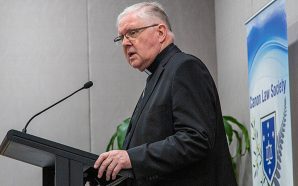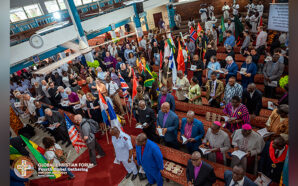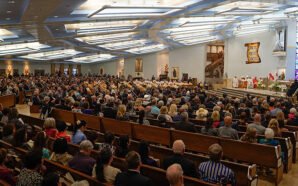Homily for Third Sunday of Easter Year A 2020
Readings: Luke 24: 13-35
26 April 2020
Cleopas and his mate who were heading out of Jerusalem at the commencement of today’s gospel were leaving town in every sense of that phrase. They’d had enough. They were done. They were down and out. At that Passover in Jerusalem, they were expecting big things. Jesus was to be their Messiah, their Saviour. A whole new world was to open up for them and their companions. Change was just around the corner. It was as if the coronavirus was going to be beaten tomorrow. But it was not to be. It all turned to dust. Their hero was not only dead. He died in disgrace, on a cross. Jesus’ reputation had been completely trashed. For Cleopas and his companion, the questions were many: Were we deluded? Was our hope no more than a fantasy? Were we conned? What possible difference could Jesus have made to our own lives, let alone to others who have not yet heard of him?
Cleopas and his mate speak about their hopes, their shattered hopes, their plans, their unrealizable plans. They’ve heard the testimony of the women. They’ve had the testimony of the women confirmed by some of their male companions. But still, they don’t get it. They are absorbed in their own experience and reflection on their hopes, expectations and plans which have been shattered. None of what has been reported is as they expected or hoped. Jesus then explains the scriptures and they still don’t get it.
LISTEN: https://soundcloud.com/frank-brennan-6/homily-26420
It’s getting late. Jesus makes as if to go on. ‘But they pressed him to stay with them’. Imagine if they had not offered him hospitality. Imagine if they had not insisted that he accept their hospitality. They forced their hospitality on Jesus just as Jesus had forced Zacchaeus to offer hospitality when he said to Zacchaeus: ‘I must stay at your house today.’ Without their hospitality, they would never have come to the realisation of who their guest was.
Jesus then blesses the bread, breaks the bread, and gives it to them. This is Jesus who at the last supper had done the same, saying, ‘I tell you, I shall not eat it until it is fulfilled in the kingdom of God.’ They recognise him. Their hearts burn within them. The kingdom is breaking in here and now at the small guest house on the road to Emmaus. But he is gone. They are once again on their own in their isolation in a small guesthouse somewhere between Jerusalem and nowhere in particular. By now it is well and truly dark, but they run the risk and scuttle back to Jerusalem to discover that their companions have enjoyed similar experiences of the Risen Lord. They find hope; they share hope; they profess hope.
Three years ago, Pope Francis reflected on this gospel scene telling us that Jesus administers a therapy of hope. He observed:
‘We have all had difficult moments in life, dark moments in which we walked in sadness, pensive, without horizons, with only a wall before us. And Jesus is always beside us to give us hope, to warm our hearts and to say: “Go ahead, I am with you. Go ahead”. The secret of the road that leads to Emmaus is simply this: despite appearances to the contrary, we continue to be loved and God will never stop loving us. God will walk with us always, always, even in the most painful moments, even in the worst moments, even in moments of defeat. That is where the Lord is. And this is our hope. Let us go forward with this hope! Because he is beside us and walks with us. Always!’
Yesterday, we commemorated Anzac Day as we never have before. There were no solemn dawn services with thousands turning out to light candles and watch the rising sun; no grand parades; no two-up schools at the RSL; and no cathedral church services. As the Prime Minister said at the Dawn Service at the War Memorial attended by only a handful of people, this Anzac Day our commemorations were ‘small, quiet and homely’. At Easter we missed our large church celebrations too. Commentators are wondering if crowds will bother returning to church once the virus passes. Let’s remember that on the road to Emmaus, there were only three at the table, and only two then made their way back to Jerusalem.
It doesn’t need a crowd of like-minded people for our hearts to burn within us. It doesn’t need a throng of witnesses for us to recognise him in the breaking of the bread. These post-Easter days we are being called back to the intimacy of our own faith journey and to the tap root of our own hope in the midst of suffering, human limitation and mortality.
In this age of twitter and so much social media which is abusive or limited to the bubble of the likeminded, let’s recall that Cleopas and his mate took time on the road to really talk to each other, to engage in meaningful conversation about their hopes and dreams, their frustrations and their woes. They didn’t start sledging each other, or having a go at Peter for being a weak leader, or venting their frustrations on Judas or those disciples who fell asleep in the garden. Could there be a lesson for all of us here? Nasty ad hominem arguments are now so common. Just look at Malcolm Turnbull’s critique of his political colleagues and the responses of his erstwhile team members this past week.
As you may know, I am a lawyer and I had the good fortune back in 1995 to have a Fulbright Scholarship at the Georgetown University Law School in Washington DC. The law school was walking distance to the US Supreme Court where I could go and listen to argument in the big cases where the nation’s leading lawyers were gathered. At that time, the great political philosopher of the US was Professor John Rawls from Harvard. He had just published a book entitled Political Liberalism in which he espoused the use of what he called ‘public reason’. He described the Supreme Court as the exemplar of public reason. It would seem that even that great and noble institution has succumbed to the scourge of our social media age, losing the art of conversation and respectful dialogue.
In a judgment delivered this past week, three dissenting Justices found ad hominem arguments being used even by the majority of their fellow Justices of the US Supreme Court. They wrote: ‘Too much public discourse today is sullied by ad hominem rhetoric, that is, attempts to discredit an argument not by proving that it is unsound but by attacking the character or motives of the argument’s proponents. The majority regrettably succumbs to this trend.’ They went on to say: ‘We should set an example of rational and civil discourse instead of contributing to the worst current trends.’ Civic, respectful discourse is more important than ever, particularly in relation to issues of great controversy, and particularly when we live in a society where there is a wide variety of religious views and secular perspectives on the big issues of life, meaning, and purpose. It’s even worse when Church people demonise each other because they disagree about gospel imperatives or church discipline.
If we are to administer the therapy of hope on our own road to Emmaus, wherever that may be, we need to be more attentive to each other in those intimate conversations, more attentive to the stranger on the road, more willing to extend hospitality to the stranger, more attentive to the stranger’s perspective on the events of our world and their insights into those events.
We Christians need to be more hospitable at the table of the eucharist and more willing to concede that our own preconceptions about God’s action in the world are likely to be reflections of our own prejudices and preferences rather than the possibilities opened up by the one amongst us who offers and receives the hospitality of God. Let’s treasure those moments when our hearts have burnt within us as we have heard another person break open the word and seen them share the bread. Let’s keep a keen eye for the one we recognise just as they vanish from our sight.
Let’s administer the therapy of hope to each other graciously, forgivingly, and with love.
Fr Frank Brennan SJ is the Rector of Newman College, Melbourne and the former CEO of Catholic Social Services Australia (CSSA).








